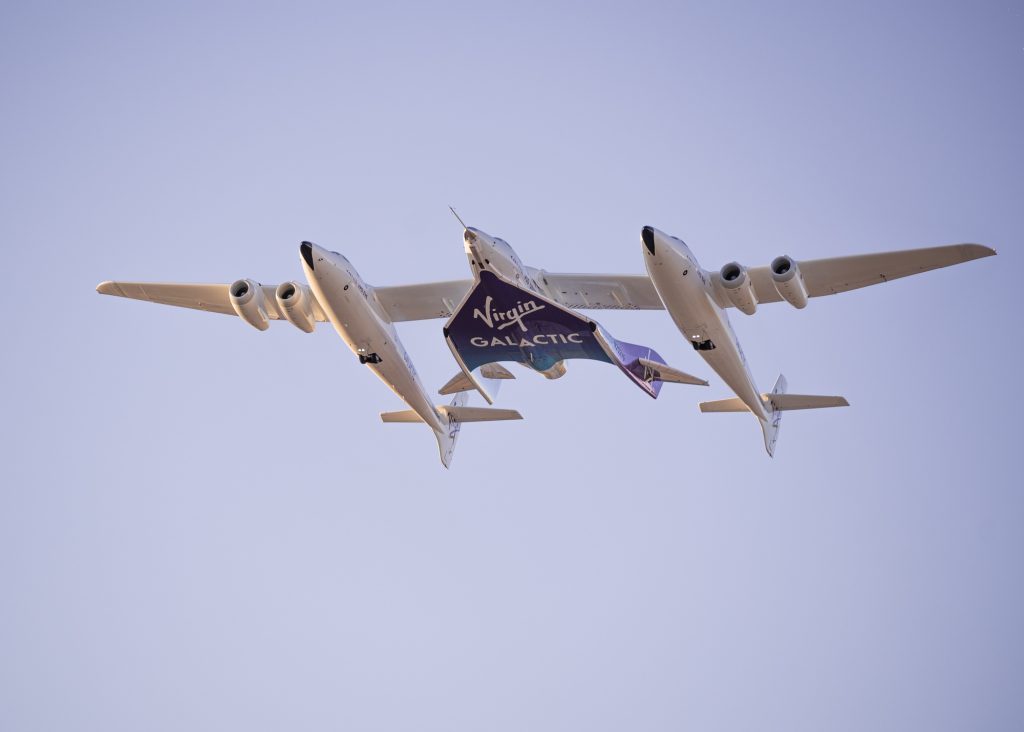WASHINGTON — Virgin Galactic is planning to fly its current “mothership” aircraft more frequently than previously planned using its upcoming Delta-class suborbital spaceplanes. This decision will allow the company to postpone the development of a new plane and handle a legal dispute with Boeing.
During a May 7 earnings call, Virgin Galactic executives mentioned that they anticipate flying their VMS Eve aircraft up to 125 times a year once they start commercial service of the Delta spaceplanes in 2026. This would assume two Delta spaceplanes in operation.
The increased flight rate of three times per week is 50% higher than earlier projections. This would enable the company to fly 750 customers annually and generate annual revenue of $450 million, considering an average ticket price of $600,000, the current list price set by Virgin.
This heightened flight rate would put the company on a path to profitability. “The third flight per week will prove highly beneficial to our business model when we resume commercial service,” said Michael Colglazier, Virgin Galactic’s chief executive, on the call. “With the launch of just our first two Delta ships, we expect to operate a robust and meaningful business with positive operating cash flow.”
“The planned increase in flight cadence for our mothership Eve is a gamechanger when our first two Delta ships enter commercial service,” added Doug Ahrens, chief financial officer of Virgin Galactic. “This is the first steppingstone in our economic growth story as these profits can be reinvested further expand our fleet and drive additional growth.”
Virgin determined that Eve could make three flights a week after developing what Colglazier called a “targeted maintenance plan and operations schedule” based on the plane’s performance in recent flights carrying VSS Unity. The plane, known as WhiteKnightTwo when developed by Scaled Composites, commenced flights in 2008 and underwent a “major enhancement program” before the series of Unity commercial flights that began last year.
Relying on Eve is part of Virgin Galactic’s strategy to preserve its existing funds and concentrate on the development of the Delta-class spaceplanes while delaying work on a new mothership to replace Eve. “We resequenced the next mothership program to better manage our capital,” he said, with that new plane now expected to enter service no earlier than 2028.
In 2022, Virgin Galactic had selected Aurora Flight Sciences, a subsidiary of Boeing, to develop the new mothership, with plans for the first plane to enter service in 2025. However, work on the plane ceased a year later.
Boeing sued Virgin Galactic in March, claiming that Virgin had not paid $26.4 million in invoices for earlier work and also misappropriated intellectual property. Virgin denied the claims andfiled a countersuit against Boeing in April , arguing that Boeing performed “shoddy and incomplete” work on the mothership contract.These dueling suits were brought up toward the end of the earnings call when an analyst inquired about them. “The issues with Boeing are not significant and will not impact how we progress our mothership program,” Colglazier mentioned. “It will not be a distraction for us.”
Some analysts raised concerns about Virgin's economic model, pointing out that many of the more than 700 customers signed on years ago when ticket prices were much lower. Ahrens explained that just over 600 customers are at lower price points and that the company's annual revenue of $450 million would be reached in about 12 months once most of its backlog has been flown.
He also mentioned that the company can sell tickets at a higher price, mentioning the upcoming Galactic 07 flight by VSS Unity, which will carry four people with an average seat price of over $800,000.
The Galactic 07 flight, set for no earlier than June 8, will be the final flight of Unity, as the company shifts its focus to developing the Delta-class vehicles. This flight will transport a private astronaut linked to Axiom Space and three private astronauts, two from the US and one from Italy.
Colglazier stated that Unity has been extremely beneficial to Virgin Galactic, influencing the design of the Delta-class vehicles. He mentioned that Unity will remain at Spaceport America after its final flight and will be used by the company for training.
Virgin Galactic plans to increase the frequency of its existing 'mothership' aircraft flights with its upcoming Delta-class suborbital spaceplanes, allowing the company to postpone the development of a new plane while dealing with a legal dispute with Boeing.









